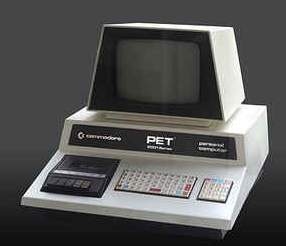Commodore PET 2001 computer
In the second half of the 1970s, long before the explosive appearance of home computers, Commodore Business Machines' ( CBM ) first personal computer, the PET 2001 (Personal Electronic Transactor), was released on the market, the "ancestor" of the later family of computers (picture).
Use
Education
Business applications
Technical scientific calculations
Individuals and schools
Structure
Central unit
Byte-organized machine.
- control unit:
- MOS 6502 microprocessor, clock speed 1 MHz
- 6-bit data and 16-bit address bus
- five 8-bit and one 16-bit registers
- high-resolution (512*512 pixels) graphics card
- main store:
- 4 / 8 MB DRAM
- 18 / 20 KB ROM (system program and character library)
- 1 KB RAM video buffer
- calculator: ALU built into a microprocessor
Periphery
- backup storage: built-in Datasette cassette recorder (+ 1 connection slot)
- external devices:
- special "chiclet" (73 keys, alphanumeric and graphic symbol keys), later regular typewriter-style keyboard
- 23 cm monochrome CRT monitor (“Dutch newsreel” style)
- interfaces:
- IEEE 488 (for floppy disk)
- serial port
- parallel port (for printer)
All-in-one design: the entire computer and keyboard were housed in a common housing
Operation
The opcodes were 1 byte, and among the 256 instructions there were also 1, 2 and 3 bytes.
The calculator performed additive operations with binary and decimal (BCD) numbers. Average execution time was 2–7 clock cycles, and operation speed was 140–500 kips.
Screen resolution (text mode only): 25 lines, 40|80 chpl.
The nominal transmission speed of the data recorder was 1500 baud, but due to double recording, its effective speed was 750 baud.
Program set
- operating system: none
- compiler: Commodore BASIC 1.0
A large number of game programs could be run
Historical curiosities
Although the PET 2001 computer was one of the most popular school and home computers of the second half of the 1970s; its limited storage capacity and increased graphics capabilities were soon followed by its improved successors, the 2001/N and 2001/B (1979), and the CBM 3000 (1980) on the European market.
It is worth noting that CBM also launched a new series in 1981 under the name PET 4000/8000, the peak of which was the Super PET 9000 (1984). The basic structure remained unchanged, further development was achieved by increasing storage capacities, expanding display modes and creating more interfaces; in the last one, even the processor was replaced by a Motorola 6800.
Resources
General Overview: Commodore PET (English)
Detailed description: Commodore PET 2001 (English)
The “Family Members”: Model Summary (English)
Business presentation: What is new? (English)
Created: 2016.07.30. 21:41
Last modified: 2021.09.03. 16:39

